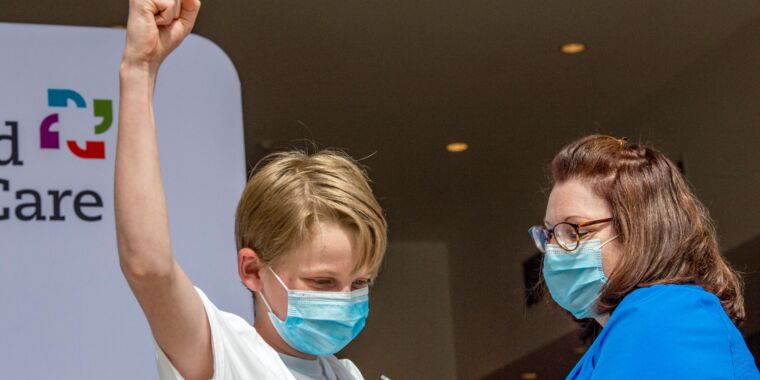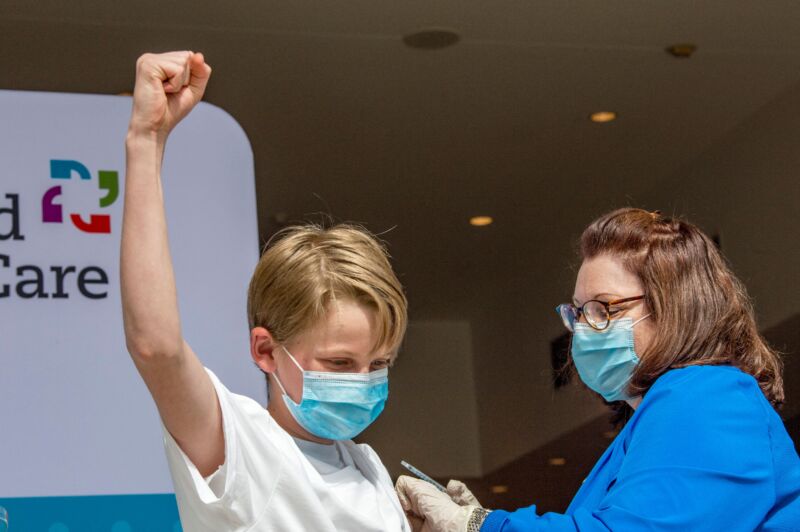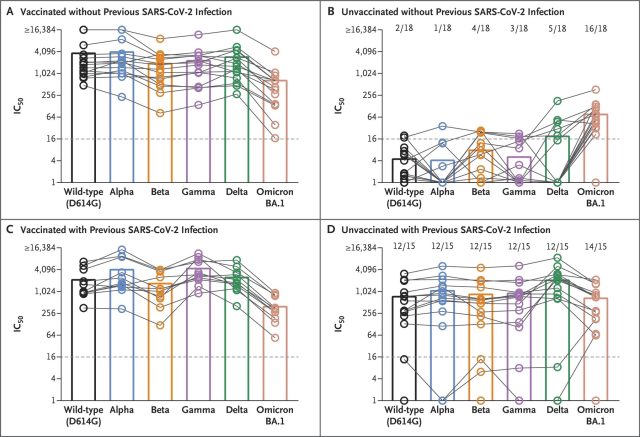

So-called “natural immunity” against COVID-19 has always been a dodgy argument for avoiding vaccination during the pandemic. But amid omicron, natural immunity is clearly rubbish.
Unvaccinated people who have recovered from an infection with the omicron coronavirus variant are left with paltry levels of neutralizing antibodies against omicron and almost no neutralizing antibodies against any of five other coronavirus variants, including delta. People who were vaccinated before getting an omicron infection, on the other hand, have strong protection against all five variants, and they are among the highest levels of neutralizing antibodies seen against omicron.
That’s all according to a new study surveying neutralizing antibody profiles in people who have all recovered from an omicron infection, with or without pre-existing immunity. The study was published Wednesday in The New England Journal of Medicine by a team of Austrian researchers. The researchers were led by virologist Janine Kimpel of the Medical University of Innsbruck.
Overall, the findings highlight that omicron is “an extremely potent immune-escape variant that shows little cross-reactivity with the earlier variants,” the authors conclude. As such, unvaccinated people who have recovered from an omicron infection might not have protection from other variants. “For full protection, vaccination is warranted,” they conclude.
The findings and conclusion are likely to rekindle discussion on the importance of “natural immunity,” which is immune protection following an infection rather than vaccination.
People who oppose getting COVID-19 shots argue that their prior infections gave them equal—if not superior—immunity to the pandemic coronavirus compared with vaccination. However, experts have repeatedly noted that, while past infection can offer protection, that protection is not always strong and can vary widely from person to person. That is, some people who recover from COVID-19 have weak immune protection, particularly if they had mild infections. Vaccination, meanwhile, offers relatively consistent and high-levels of protection. Moreover, so-called hybrid protection—getting vaccinated after an infection—offers some of the highest levels of protection.
Variants and vaccines
Still, the omicron wave has been the pandemic’s golden age of confirmation bias for those who oppose vaccines. The ultratransmissible coronavirus variant is perceived as milder than earlier versions, and it can thwart defenses from vaccines, leading to more breakthrough infections. To some, this conflagration makes vaccines appear both less necessary and less useful.
But omicron is not a mild virus. According to data from the Centers for Disease Control and Prevention, nearly 146,000 people in the US have died of COVID-19 since January 1, when the omicron surge was well underway. By the end of January, the country saw a record high for hospitalizations, with a seven-day average of nearly 160,000 per day.
And vaccines have clearly been effective. People ages 12 and up who were vaccinated and boosted amid the omicron wave were 3.5-times less likely to test positive for COVID-19 and 21-times less likely to die of COVID-19.
The new study led by Kimpel adds further evidence for the usefulness of vaccines and vaccines’ clear advantage over natural immunity. The researchers looked at neutralizing antibody levels in four groups of people who had recently recovered from an omicron infection: 15 vaccinated people; 18 unvaccinated people; 11 vaccinated people who had previously been infected (with wildtype, alpha, or delta variants); and 15 unvaccinated people who had been previously infected. The researchers looked at each persons’ neutralizing antibody levels against six variants: wildtype, alpha, beta, gamma, delta, and omicron.

The unvaccinated people fared the worst, producing a mean 50-percent neutralizing antibody titer of just 79.5 against omicron. The mean titer against omicron in vaccinated people was 680. Unvaccinated people also had low- to negligible-levels of neutralizing antibodies against the other five variants.
People who were in either the vaccinated group or the vaccinated and previously infected group had the highest levels of protection against all six variants. People who were unvaccinated but had had immunity from an infection prior to omicron had higher and broader protection than the unvaccinated group. However, antibody levels were more variable and lower overall than those seen in the vaccinated groups.
The study has limitations, such as the small group sizes. However, the data demonstrates that omicron infections do not provide broad protection against coronavirus variants. It also bolsters earlier findings that past coronavirus infections don’t provide the same consistent and high levels of protection as vaccination.